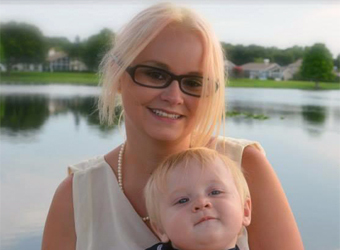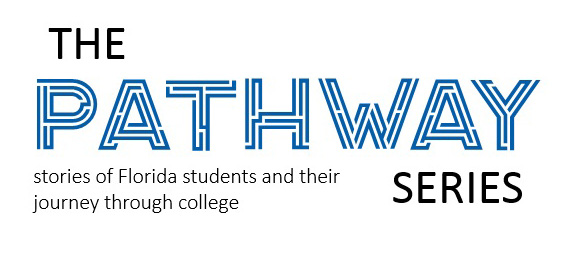This is the fourth and final entry in the “Pathway Series” of stories on Destiny Jedlicka, an Orlando resident who grew up in Florida’s foster care system. Read Part 3 here, which chronicled Jedlicka’s hectic spring semester at Rollins College in Winter Park. In Part 4, Jedlicka looks back at her first year at Rollins and shares her summer plans.
Although she elected not to take any classes during the summer, Rollins College wasn’t very far from Destiny Jedlicka’s mind these past few months.
Jedlicka recently completed her first year at Rollins after transferring from Valencia College in Orlando, where she earned an associate’s degree in general studies. But it’s Jedlicka’s upcoming school year that occupied much of her thoughts as she worked to sort out her financial aid situation in time for the fall semester.
After paying for her first year at Rollins thanks to a combination of institutional scholarships (from Rollins), a partial Pell Grant, and both subsidized and unsubsidized loans, Jedlicka missed the deadline to reapply for her scholarship from Rollins for the upcoming year.
Jedlicka, who jointly files her taxes along with her husband, also didn’t qualify for a Pell Grant for 2018-19.
“It’s the first time I didn’t qualify for it (Pell Grant), so it was a shock,” Jedlicka said. “They said my income was too high, but it’s really my husband’s income since I make half of what he makes. He’s just gotten good raises and bonuses recently.”
To help mitigate the loss of those funds, Jedlicka — who works full-time as an HR assistant for an Orland-based pest control business — has registered full-time (12 credits) at Rollins in the fall after taking two evening classes per semester during her first year at Rollins.
“It’s a little nerve-wracking because I’m going to be more limited on time with my family and the time I have to study,” Jedlicka said. She previously worked full-time and carried a full-time course load during her stint at Valencia, but was able to take some of her courses online. “One of my classes is at 4 and the other two are in the evening, and I can’t do them online.
“My job is working with me and my schedule so I can adjust it as needed.”
Registering full-time not only helps students graduate quicker, it often provides students access to additional financial aid. The increased course load allows Jedlicka to qualify for the Effective Access to Student Education (EASE) Grant, worth $3,500 for the 2018-19 school year. In addition to her state aid, she will rely on subsidized and unsubsidized Stafford loans to cover the rest of her costs.
The mounting student debt has started to weigh on Jedlicka.
“I’d really like to get to a point where I can eliminate one loan, or not have any loans at all to pay for school,” Jedlicka said. “It’s a scary thing to know how much debt you get into going to school and realizing you have to pay it back.”
Jedlicka said she was able to put aside her financial aid concerns during the fall and spring semesters.
“That’s more of an issue during the summer,” Jedlicka said. “I sort of push that aside when I’m going through my classes and try to do well there. That’s my primary focus.”
Jedlicka — who bounced around many schools throughout her childhood after entering Florida’s foster care system at age 8 — is pursuing a business degree with a minor in occupational studies.
She’s largely satisfied with her academic performance this past year.
“I wish I could be perfect, but that’s not possible,” said Jedlicka who added that her GPA is currently between 3.2 and 3.5. “I strive for perfection, but I think my grades are fair with what I’m able to do since I am somewhat limited in how much time I can spend on homework.”
More importantly, her first year at Rollins helped provide some clarity in terms of her chosen career path.
“The biggest thing that’s changed is I understand more the social impact that businesses can have as opposed to the corporate side that you always hear about,” Jedlicka said. Her Social Entrepreneurship course during the fall required her to create a mock company, which Jedlicka used as an opportunity to expand on a real-life business idea to benefit parents of young children. “I learned about how you can get involved with nonprofits and other charitable organizations and just generally be a kinder, more helpful business person.”
She also appreciated the responsiveness and flexibility of the faculty and staff at Rollins.
“I work full time and have a young child at home, so it’s really hard for me to go handle things in person (at Rollins),” said Jedlicka, who has been married for seven years and has a 4-year-old son. “Any question or issue I had, I’d get a quick response or I could take care of it via phone or email.”
Additionally, Jedlicka didn’t allow the uncertainty surrounding her financial aid situation this summer to dampen her family time this summer.
“Right now, I’m really trying to spend as much time as I can with my child and my husband, going to the beach, doing stuff around the house, and anything else we can think of,” she said. “I had a good first year at Rollins but right now I’m taking all the extra time with them that I can.”
This story is part of Florida College Access Network’s “Pathway Series”, a year-long project that seeks to highlight the diversity of experiences students face as they pursue postsecondary degrees. Each student will be profiled at the start of the school year, during the fall, in the spring, and during the summer following the conclusion of their first year.
RELATED ARTICLES:
Destiny Jedlicka works her way through trying semester at Rollins College
Destiny Jedlicka is making new memories and finding inspiration at Rollins College
Destiny Jedlicka: With Foster Care in the Past, The Time for College is Now
Introducing “The Pathway Series: Stories of Florida Students and Their Journey Through College”


